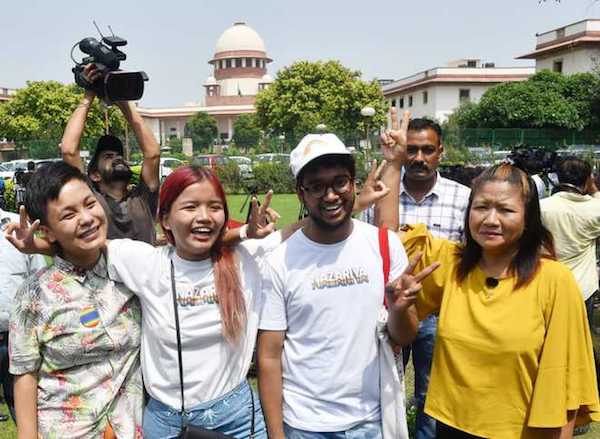
UN lauds SC verdict
NEW DELHI(TIP): In a historic verdict, the Supreme Court, on Thursday, September 6, de-criminalized homosexual acts between consenting adults in private, bringing cheers to millions of members of the LGBT community who had been hounded for their sexual orientation under Section 377 of the Indian Penal Code that made it a punishable offence.
A five-judge Constitution Bench, headed by Chief Justice of India Dipak Misra, read down the British-era law, terming it “irrational, indefensible and manifestly arbitrary”.
It reversed the top court’s 2013 judgment which re-criminalized consensual gay sex. The 2013 verdict had overturned a 2009 judgment of the Delhi High Court which had de-criminalized homosexual acts between consenting adults in private.
The verdict will not reopen concluded cases under Section 377 but can be relied upon in pending matters against the LGBT community members.
The five judges wrote four concurring verdicts. While CJI Misra and Justice AM Khanwilkar delivered one verdict, Justices Rohinton Nariman, Dhananjay Chandrachud and Indu Malhotra wrote separate verdicts.
The top court said homosexuality was a type of sexual orientation and not a disease and members of the lesbian, gay, bisexual and transgender (LGBT) community deserved to be treated with human dignity. Terming sexual orientation a “biological phenomenon”, it said any discrimination on this ground was violative of their fundamental rights.
Section 377 refers to ‘unnatural offences’ and says whoever voluntarily has carnal inter-course against the order of nature with any man, woman or animal shall be punished with imprisonment for life, or with imprisonment of either description for a term which may extend to 10 years and shall also be liable to pay a fine.
The judgment came on petitions by dancer Navtej Jauhar, journalist Sunil Mehra, chef Ritu Dalmia, hoteliers Aman Nath and Keshav Suri, business executive Ayesha Kapur and 20 IITians challenging the validity of Section 377.
“Section 377, so far as it penalizes any consensual sexual relationship between two adults, be it homosexuals (man and a man), heterosexuals (man and a woman) or lesbians (woman and a woman), cannot be regarded as constitutional.
“However, if anyone, by which we mean both a man and a woman, engages in any kind of sexual activity with an animal, the said aspect of Section 377 is constitutional, and it shall remain a penal offence,” the CJI ruled. Any act without the consent of the other person would also invite penal liability.
The SC also declared parts of Section 377 as an unreasonable restriction on right to freedom of speech and expression. In his separate but concurring verdict, Justice Chandrachud, said, “Members of LGBT community are entitled, as all other citizens, to the full range of constitutional rights.”
Justice Nariman directed the Centre to ensure that the verdict was given wide publicity. He also asked for “programs to reduce and finally eliminate the stigma associated with such persons” and sensitize government officials, particularly police officials, about the plight of LGBT persons.
Meanwhile, United Nations India Thursday, September 6, lauded the Supreme Court for striking down a “key component” of IPC’s Section 377 which criminalizes “specific sexual acts between adults” and said the judgment will boost efforts to eliminate stigma and discrimination against LGBTI persons.
It also hoped the ruling will be the first step towards guaranteeing the full range of fundamental rights to LGBTI persons.
Sexual orientation and gender expression form an integral part of an individual’s identity the world over, and violence, stigma and discrimination based on these attributes constitute an “egregious” violation of human rights, it said.
“The United Nations in India welcomes the landmark ruling by the Supreme Court of India striking down a key component of Section 377 of the Indian Penal Code which criminalized specific sexual acts between adults, a law dating back to British colonial rule that has targeted in particular lesbian, gay, bisexual, transgender and intersex (LGBTI) individuals and communities,” it said in a statement.





Be the first to comment